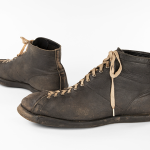Last month, our curatorial team participated in the global event, #AskaCurator. In case you missed it, here’s our Creative Director & Senior Curator, Elizabeth, answering some of your questions.
As John Fluevog is celebrating his 50th anniversary this year, what would you say his impact has been on Canadian and global shoe design?
John Fluevog’s designs have captured the imagination of fashion since he first started out. He is gifted with being able to consistently offer new designs that are both unexpected and immediately recognizable as his. The museum has shoe designed by him from the beginning of his career to his most recent style created to honour Dr. Bonnie Henry, the B.C. Provincial Health Officer.
How many children’s shoes are in the collection?
We have over 1000 children’s shoes!
When did children start to wear shoes on a regular basis? I realize that many children would go barefoot as instants. We in the Western world seem so quick to stuff growing feet into stylish and expensive shoes. When did this start?
The wearing of footwear has long been a defining feature of appropriate dress in many cultures and is reflected in the gifting of baby shoes to newborns. I think that this shodding of small children is part of a larger desire to ensure that they start off ‘on the right foot’ which is an idea laden with cultural expectation.
Where do you find shoes for your museum?
Every place imaginable! It can range from high-end auction houses to footwear saved from the garbage. In fact, some of our most interesting shoes have been those that were discarded.
Besides shoes, what other accessories helped people express themselves?
There are many accessories that have been, and continue to be, important. Hats are a perfect example. They used to be an essential part of ‘appropriate’ outdoor attire in Western fashion. While this is no longer the case, we have seen hats be central to young men’s fashion for decades recently.
Stay tuned for November when we bring back our Ask a Curator IGTV Series!


